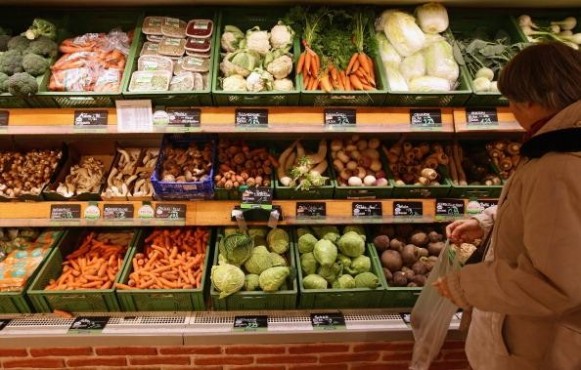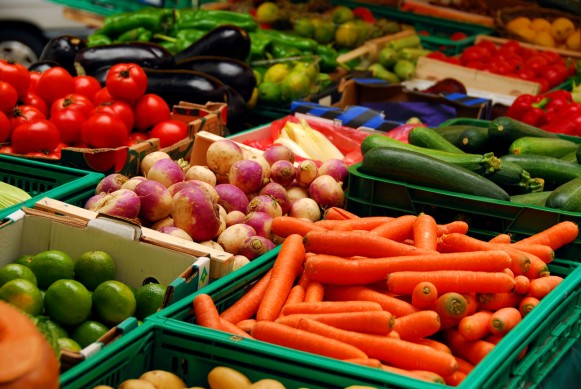Organic is a word that many of us are familiar with. While shopping at the local grocery store, you come across a gallon of milk that is labeled “organic.” It’s minutely more expensive than your typical standard whole milk. At the moment, the extra dollar doesn’t seem appealing to pay. “Isn’t all food created equal?” you may ask. The truth of the matter is no. All food is not created equal. The benefits of eating organically outweigh any level of skepticism you may have.
Organic first begins at the farm with the farmer. He is responsible to give his livestock 100% organic feed. This means no animal byproduct or plastic pellets — yes, plastic pellets! — for roughage. A dairy product such as milk or yogurt in order to be labeled organic has to be handled in this fashion for a total of 12 months before being able to be sold. If an animal is to be raised as “organic beef,” the mother must have had organic feed for at least the last third of gestation period of the calf. The livestock is to not be injected with growth promoters, such as rsBt, they shall not be fed manure, shall not be given parasiticides on a regular basis, or injected with synthetic chemicals that simulate anti-biotics. The cow in organic farming has to have at least 120 days of grazing each year. Where as a cow in non-organic farming, well, they don’t really graze at all.
In the cultivation of fruits and vegetables that do not involve the use of chemical or biological pesticides (that have a potential toxicity to humans, animals, and the environment) these are also deemed “organic”. In organic farming the use of natural pesticides is available and are not allowed to be from any synthetic source. Most organic farmers resort to old methods when it comes to dealing with pests. This includes but is not limited to insect traps, disease resistant crop selection, and the implementation of biological factors such as beneficial microorganisms and/or predator bugs.
“If when you are eating such non-organic foods, you took into account the origin, would you still eat the product? If you knew that the farm in which the glass of milk you are dipping your Oreos into fed the cows plastic pellets to create roughage, would that glass of milk look or even taste the same to you? Consider the cows, who by nature, are supposed to be grazing & feeding on grass with a life expectancy of 20 years, but instead are being fed corn, their own manure, or even worse other cows…”
In the past, pesticides such as DDT (dichloro-diphenyl-trichloroethane) were frequently used and recommended by “Uncle Sam.” Beginning in 1943, the use of DDT was popular up into the early 1960’s. At which time an American biologist, Rachel Carson, wrote the book called Silent Spring, in this book she catalogued the haphazard use of such a chemical on the environment. Carson explained the connection DDT had to the decline in wildlife (specifically birds), and the connection to cancer and other illnesses in humans. The most noted effect agreed upon within the science community of DDT was the amount of time it took to breakdown in any soil it touched giving it the halflife of 75%. Basically, the soil would be no good for cultivation sooner, than later.
Another pesticide that is in use called imidacloprid was recently, on April 5th, 2012, announced by the Harvard School of Public Health to be the culprit to the worldwide collapse of honey bee colonies, called Colony Collapse Disorder (CCD). This is the strange phenomenon where the adult bee abandons the hive. When this happens the bees cease pollination and honey production. The queen bee ultimately dies as well. According to the study performed at Harvard over a 23 week period, low doses of imidacloprid caused 94% of the bee hives (15 out of 16) in the study to die.
Honey bees are a major player in the propagation of all agriculture on a global scale. Think of all the fruits, vegetables, nuts etc., we eat. We can owe their germination to a honey bee. Yet, slowly but surely they are killing them off for the perpetual use of chemical pesticides. The typical organic farmer is conscious of these matters, and that is why they opt to use natural methods. These methods can be used by any farmer within the industry, but they chose not too. Why? Simply put, they don’t care about you or me. They care about the capital. No one can be safe with that approach.
If when you are eating such non-organic foods, you took into account the origin, would you still eat the product? If you knew that the farm in which the glass of milk you are dipping your Oreos into fed the cows plastic pellets to create roughage, would that glass of milk look or even taste the same to you? Consider the cows, who by nature, are supposed to be grazing & feeding on grass with a life expectancy of 20 years, but instead are being fed corn, their own manure, or even worse other cows — which is how “Mad Cow Disease” started! The typical life span for a cow in the dairy industry is 4 – 6 years. T
his reflects the level of neglect, and perverse treatment of a food that we ingest (according to Hypertextbook.com) on average of 63.3 pounds per capita! I don’t even want to go into poultry. Where chickens are caged up 24/7, many go limp and become ill with the poor facilities where they are kept. Egg yolks, which are suppose to reflect the health of a chicken as bright orange, show as a pale shade of yellow. When you purchase non-organic, this is the type of industry you are supporting.
The progression of the “Organic movement” is stifled by effects of disinformation spread by a mass conglomerate of food providers. They want you to be satisfied with the radioactive food you are taking out of the microwave, and the genetically modified organism (GMO, another matter in question that hasn’t been studied to know the adverse effects of) that was created in a lab to simulate corn. These entities don’t want you to understand that the cliché “You are what you eat” is true. Consequently, you will suffer the repercussions of such poor dietary allowances down the line. In a time in history when Obesity is a pandemic, it’s clear to see that something is array. Could it be what we are consuming is devouring us?
“The first step to truly obtain optimal health is to scrutinize that which we are consuming, food. We must be active in the pursuit of what we deserve and that is to eat a healthy piece of steak, or drink a tall glass of milk from a cow that didn’t have a pus filled udder! Organic food is a step in the right direction. Even if it means spending a few extra dollars, and perhaps minimizing the portions, do so! Overtime, you will see the results of the implementation and also feel as if you are pushing humanity in the right direction.”
When one ingests food, it is the job of our digestive system to break down the meal and absorb the nutrients. The benefit of eating organic is that when this process begins we can be assured that our body will not be exposed to an excess of chemicals, synthetic hormones or any other detrimental factors which the food may have been exposed to. Organic farming methods guarantee us that all product is being treated with natural pesticides, fertilizers and feed. We are consuming a product that encourages us to stay healthy versus a product that is simply made to squelch hunger pains.
The first step to truly obtain optimal health is to scrutinize that which we are consuming, food. We must be active in the pursuit of what we deserve and that is to eat a healthy piece of steak, or drink a tall glass of milk from a cow that didn’t have a pus filled udder! Organic food is a step in the right direction. Even if it means spending a few extra dollars, and perhaps minimizing the portions, do so! Overtime, you will see the results of the implementation and also feel as if you are pushing humanity in the right direction. Supporting Organic Local Farmers is crucial as well. When industry numbers reflect the demand for Organic products over non-Organic, it will be the start of a revolution.
Before you go, ponder on the thought that you may be consuming a cow or chicken that lived a very sad, cruel, and unhappy life. Do you think as a member of the universe this will not have an affect on your being as well? You are consuming the flesh of a creature who was unhappy! That unhappiness transcends, and the energy is pervasive. We should desire humane treatment of all animals that are apart of our diet. Not only because it is our right but also because they deserve it and we deserve it. We have to stop being idle minded about these issues that affect us on a daily basis and be active. That doesn’t mean going out and protesting, or even becoming a Vegetarian or Vegan. The first step can be as simple as buying organic.
Cheers!





Comments
While I really enjoyed this article and was happy to see it on Quiet Lunch, I can’t say that I whole heartedly agree with everything stated. I’ll even go beyond that to say that the author’s concluding paragraph was written without critical facts about our nation’s commercial farming being exposed or expressed. Buying organic DOES NOT MEAN that the animal was treated or slaughter humanely. If that is what you’re looking for, find it with the stamp of: Certified Humane, American Humane Certified, or Animal Welfare Approved. Many are fooled by standards regarding “free-range” or “cage-free” and don’t understand that the animal can still be overcrowded, without a cage, but in a small, confining area.
As for dairy cows, there’s a whole different issue. Cows produce milk after they give birth. The mother is not allowed to have her calf after birth because that milk doesn’t go to the calf-it goes to fill your glass to dunk oreos. Thus, the cow will be kept pregnant to ensure that everlasting and fruitful milk-mustache.
While I do support this article and praise the author for bringing up CCD, I wish that it didn’t have the unfortunate connotation that eating organic means for a ‘happy cow.’
Thanks and all the best,
Brittany
Find more online! Research your heart out! A good site is: http://www.globalanimal.org/2011/11/08/humane-labeling/57454/
Hi Brittany,
Appreciating your feedback, I’d like to add that I don’t believe any cow that is off to being butchered is truly “happy.” The above article was simply emphasizing the difference of initiating the consumption of “Organic foods” into one’s diet. As per the globalanimal.com article you’ve provided, it in itself describes organic and grassfed as a “Good start.” You may liken this article as a push in that direction. My intent as the author was to encourage consumers who perhaps couldn’t discern the benefit of purchasing organic and then persuading them to do so based upon a general overview. Still, Thank you for providing the link as I feel the additional information is truly beneficial. As a promoter of animal rights myself, I enjoyed the zeal you provided!
Sincerely,
Nina